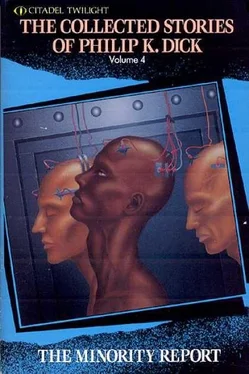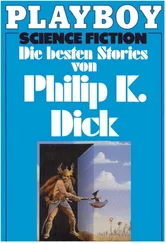After a long time, Fowler said in a hoarse voice, "The presumption by the parent would be that the child had lost or destroyed one of the soldiers. Gradually the set would dwindle – with the child getting the blame."
Pinario said, "What do you recommend?"
"Keep it in action," Fowler said, with a nod from Wiseman. "Let it work out its cycle. But don't leave it alone."
"I'll have somebody in the room with it from now on," Pinario agreed.
"Better yet, stay with it yourself," Fowler said.
To himself, Wiseman thought: Maybe we all better stay with it. At least two of us, Pinario and myself.
I wonder what it did with the pieces, he thought.
What did it make?
By the end of the week, the citadel had absorbed four more of the soldiers.
Watching it through a monitor, Wiseman could see in it no visible change. Naturally. The growth would be strictly internal, down out of sight.
On and on the eternal assaults, the soldiers wriggling up, the citadel firing in defense. Meanwhile, he had before him a new series of Ganymedean products. More recent children's toys to be inspected.
"Now what?" he asked himself.
The first was an apparently simple item: a cowboy costume from the ancient American West. At least, so it was described. But he paid only cursory attention to the brochure: the hell with what the Ganymedeans had to say about it.
Opening the box, he laid out the costume. The fabric had a gray, amorphous quality. What a miserably bad job, he thought. It only vaguely resembled a cowboy suit; the lines seemed unformed, hesitant. And the material stretched out of shape as he handled it. He found that he had pulled an entire section of it into a pocket that hung down.
"I don't get it," he said to Pinario. "This won't sell."
"Put it on," Pinario said. "You'll see."
With effort, Wiseman managed to squeeze himself into the suit. "Is it safe?" he asked.
"Yes," Pinario said. "I had it on earlier. This is a more benign idea. But it could be effective. To start it into action, you fantasize."
"Along what lines?"
"Any lines."
The suit made Wiseman think of cowboys, and so he imagined to himself that he was back at the ranch, trudging along the gravel road by the field in which black-faced sheep munched hay with that odd, rapid grinding motion of their lower jaws. He had stopped at the fence – barbed wire and occasional upright posts – and watched the sheep. Then, without warning, the sheep lined up and headed off, in the direction of a shaded hillside beyond his range of vision.
He saw trees, cypress growing against the skyline. A chicken hawk, far up, flapped its wings in a pumping action… as if, he thought, it's filling itself with more air, to rise higher. The hawk glided energetically off, then sailed at a leisurely pace. Wiseman looked for a sign of its prey. Nothing but the dry mid-summer fields munched flat by the sheep. Frequent grasshoppers. And, on the road itself, a toad. The toad had burrowed into the loose dirt; only its top part was visible.
As he bent down, trying to get up enough courage to touch the warty top of the toad's head, a man's voice said nearby him, "How do you like it?"
"Fine," Wiseman said. He took a deep breath of the dry grass smell; he filled his lungs. "Hey, how do you tell a female toad from a male toad? By the spots, or what?"
"Why?" asked the man, standing behind him slightly out of sight.
"I've got a toad here."
"Just for the record," the man said, "can I ask you a couple of questions?"
"Sure," Wiseman said.
"How old are you?"
That was easy. "Ten years and four months," he said, with pride.
"Where exactly are you, at this moment?"
"Out in the country, Mr. Gaylord's ranch, where my dad takes me and my mother every weekend when we can."
"Turn around and look at me," the man said. "And tell me if you know me."
With reluctance, he turned from the half-buried toad to look. He saw an adult with a thin face and a long, somewhat irregular nose. "You're the man who delivers the butane gas," he said. "For the butane company." He glanced around, and sure enough, there was the truck, parked by the butane gate. "My dad says butane is expensive, but there's no other -"
The man broke in, "Just for the sake of curiosity, what's the name of the butane company?"
"It's right on the truck," Wiseman said, reading the large painted letters. "Pinario Butane Distributors, Petaluma, California. You're Mr. Pinario."
"Would you be willing to swear that you're ten years old, standing in a field near Petaluma, California?" Mr. Pinario asked.
"Sure." He could see, beyond the field, a range of wooded hills. Now he wanted to investigate them; he was tired of standing around gabbing. "I'll see you," he said, starting off. "I have to go get some hiking done."
He started running, away from Pinario, down the gravel road. Grasshoppers leaped away, ahead of him. Gasping, he ran faster and faster.
"Leon!" Mr. Pinario called after him. "You might as well give up! Stop running!"
"I've got business in those hills," Wiseman panted, still jogging along. Suddenly something struck him full force; he sprawled on his hands, tried to get back up. In the dry midday air, something shimmered; he felt fear and pulled away from it. A shape formed, a flat wall…
"You won't get to those hills," Mr. Pinario said, from behind him. "Better stay in roughly one place. Otherwise you collide with things."
Wiseman's hands were damp with blood; he had cut himself falling. In bewilderment, he stared down at the blood…
Pinario helped him out of the cowboy suit, saying, "It's as unwholesome a toy as you could want. A short period with it on, and the child would be unable to face contemporary reality. Look at you."
Standing with difficulty, Wiseman inspected the suit; Pinario had forcibly taken it from him.
"Not bad," he said in a trembling voice. "It obviously stimulates the withdrawal tendencies already present. I know I've always had a latent retreat fantasy toward my childhood. That particular period, when we lived in the country."
"Notice how you incorporated real elements into it," Pinario said, "to keep the fantasy going as long as possible. If you'd had time, you would have figured a way of incorporating the lab wall into it, possibly as the side of a barn."
Wiseman admitted, "I – already had started to see the old dairy building, where the farmers brought their market milk."
"In time," Pinario said, "it would have been next to impossible to get you out of it."
To himself, Wiseman thought, If it could do that to an adult, just imagine the effect on a child.
"That other thing you have there," Pinario said, "that game, it's a screwball notion. You feel like looking at it now? It can wait."
"I'm okay," Wiseman said. He picked up the third item and began to open it.
"A lot like the old game of Monopoly," Pinario said. "It's called Syndrome."
The game consisted of a board, plus play money, dice, pieces to represent the players. And stock certificates.
"You acquire stock," Pinario said, "same as in all this kind, obviously." He didn't even bother to look at the instructions. "Let's get Fowler down here and play a hand; it takes at least three."
Shortly, they had the Division Director with them. The three men seated themselves at a table, the game of Syndrome in the center.
"Each player starts out equal with the others," Pinario explained, "same as all this type, and during the play, their statuses change according to the worth of the stock they acquire in various economic syndromes."
The syndromes were represented by small, bright plastic objects, much like the archaic hotels and houses of Monopoly.
Читать дальше










